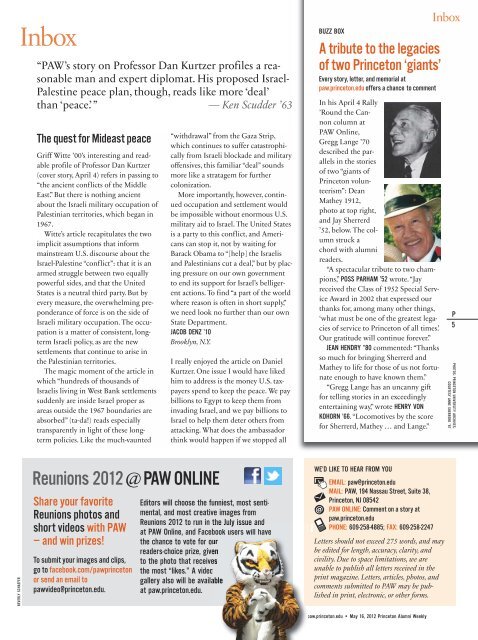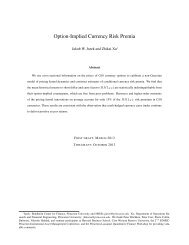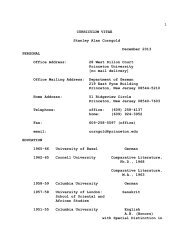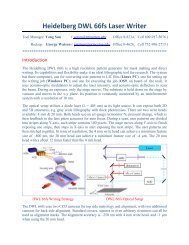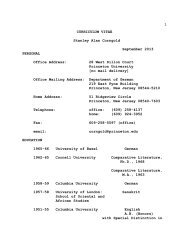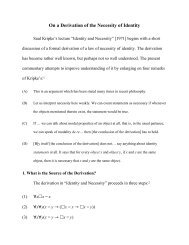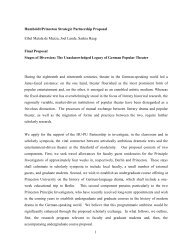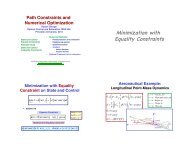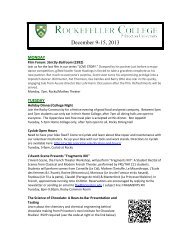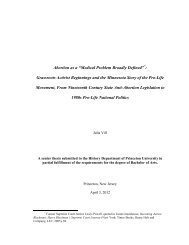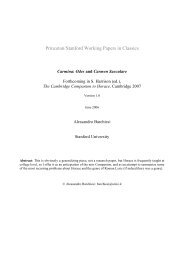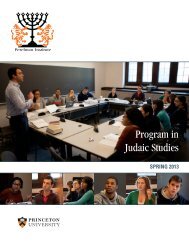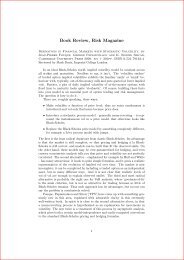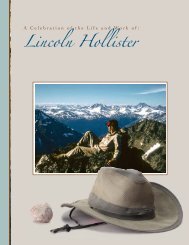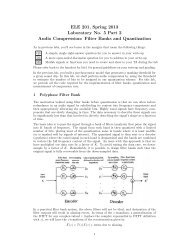Campaign residen the P -litics - Princeton University
Campaign residen the P -litics - Princeton University
Campaign residen the P -litics - Princeton University
Create successful ePaper yourself
Turn your PDF publications into a flip-book with our unique Google optimized e-Paper software.
BEVERLY SCHAEFER<br />
Inbox<br />
“PAW’s story on Professor Dan Kurtzer profiles a reasonable<br />
man and expert diplomat. His proposed Israel-<br />
Palestine peace plan, though, reads like more ‘deal’<br />
than ‘peace.’” — Ken Scudder ’63<br />
The quest for Mideast peace<br />
Griff Witte ’00’s interesting and readable<br />
profile of Professor Dan Kurtzer<br />
(cover story, April 4) refers in passing to<br />
“<strong>the</strong> ancient conflicts of <strong>the</strong> Middle<br />
East.” But <strong>the</strong>re is nothing ancient<br />
about <strong>the</strong> Israeli military occupation of<br />
Palestinian territories, which began in<br />
1967.<br />
Witte’s article recapitulates <strong>the</strong> two<br />
implicit assumptions that inform<br />
mainstream U.S. discourse about <strong>the</strong><br />
Israel-Palestine “conflict”: that it is an<br />
armed struggle between two equally<br />
powerful sides, and that <strong>the</strong> United<br />
States is a neutral third party. But by<br />
every measure, <strong>the</strong> overwhelming preponderance<br />
of force is on <strong>the</strong> side of<br />
Israeli military occupation. The occupation<br />
is a matter of consistent, longterm<br />
Israeli policy, as are <strong>the</strong> new<br />
settlements that continue to arise in<br />
<strong>the</strong> Palestinian territories.<br />
The magic moment of <strong>the</strong> article in<br />
which “hundreds of thousands of<br />
Israelis living in West Bank settlements<br />
suddenly are inside Israel proper as<br />
areas outside <strong>the</strong> 1967 boundaries are<br />
absorbed” (ta-da!) reads especially<br />
transparently in light of <strong>the</strong>se longterm<br />
policies. Like <strong>the</strong> much-vaunted<br />
Reunions 2012 @ PAW ONLINE<br />
Share your favorite<br />
Reunions photos and<br />
short videos with PAW<br />
– and win prizes!<br />
To submit your images and clips,<br />
go to facebook.com/pawprinceton<br />
or send an email to<br />
pawvideo@princeton.edu.<br />
“withdrawal” from <strong>the</strong> Gaza Strip,<br />
which continues to suffer catastrophically<br />
from Israeli blockade and military<br />
offensives, this familiar “deal” sounds<br />
more like a stratagem for fur<strong>the</strong>r<br />
colonization.<br />
More importantly, however, continued<br />
occupation and settlement would<br />
be impossible without enormous U.S.<br />
military aid to Israel. The United States<br />
is a party to this conflict, and Americans<br />
can stop it, not by waiting for<br />
Barack Obama to “[help] <strong>the</strong> Israelis<br />
and Palestinians cut a deal,” but by placing<br />
pressure on our own government<br />
to end its support for Israel’s belligerent<br />
actions. To find “a part of <strong>the</strong> world<br />
where reason is often in short supply,”<br />
we need look no fur<strong>the</strong>r than our own<br />
State Department.<br />
JACOB DENZ ’10<br />
Brooklyn, N.Y.<br />
I really enjoyed <strong>the</strong> article on Daniel<br />
Kurtzer. One issue I would have liked<br />
him to address is <strong>the</strong> money U.S. taxpayers<br />
spend to keep <strong>the</strong> peace. We pay<br />
billions to Egypt to keep <strong>the</strong>m from<br />
invading Israel, and we pay billions to<br />
Israel to help <strong>the</strong>m deter o<strong>the</strong>rs from<br />
attacking. What does <strong>the</strong> ambassador<br />
think would happen if we stopped all<br />
Editors will choose <strong>the</strong> funniest, most sentimental,<br />
and most creative images from<br />
Reunions 2012 to run in <strong>the</strong> July issue and<br />
at PAW Online, and Facebook users will have<br />
<strong>the</strong> chance to vote for our<br />
readers-choice prize, given<br />
to <strong>the</strong> photo that receives<br />
<strong>the</strong> most “likes.” A video<br />
gallery also will be available<br />
at paw.princeton.edu.<br />
BUZZ BOX<br />
Atributeto<strong>the</strong>legacies<br />
of two <strong>Princeton</strong> ‘giants’<br />
Every story, letter, and memorial at<br />
paw.princeton.edu offers a chance to comment<br />
In his April 4 Rally<br />
’Round <strong>the</strong> Cannon<br />
column at<br />
PAW Online,<br />
Gregg Lange ’70<br />
described <strong>the</strong> parallels<br />
in <strong>the</strong> stories<br />
of two “giants of<br />
<strong>Princeton</strong> volunteerism”:<br />
Dean<br />
Ma<strong>the</strong>y 1912,<br />
photo at top right,<br />
and Jay Sherrerd<br />
’52, below. The column<br />
struck a<br />
chord with alumni<br />
readers.<br />
“A spectacular tribute to two champions,”<br />
POSS PARHAM ’52 wrote. “Jay<br />
received <strong>the</strong> Class of 1952 Special Service<br />
Award in 2002 that expressed our<br />
thanks for, among many o<strong>the</strong>r things,<br />
‘what must be one of <strong>the</strong> greatest legacies<br />
of service to <strong>Princeton</strong> of all times.’<br />
Our gratitude will continue forever.”<br />
JEAN HENDRY *80 commented: “Thanks<br />
so much for bringing Sherrerd and<br />
Ma<strong>the</strong>y to life for those of us not fortunate<br />
enough to have known <strong>the</strong>m.”<br />
“Gregg Lange has an uncanny gift<br />
for telling stories in an exceedingly<br />
entertaining way,” wrote HENRY VON<br />
KOHORN ’66. “Locomotives by <strong>the</strong> score<br />
for Sherrerd, Ma<strong>the</strong>y ... and Lange.”<br />
WE’D LIKE TO HEAR FROM YOU<br />
EMAIL: paw@princeton.edu<br />
MAIL: PAW, 194 Nassau Street, Suite 38,<br />
<strong>Princeton</strong>, NJ 08542<br />
PAW ONLINE: Comment on a story at<br />
paw.princeton.edu<br />
PHONE: 609-258-4885; FAX: 609-258-2247<br />
Letters should not exceed 275 words, and may<br />
be edited for length, accuracy, clarity, and<br />
civility. Due to space limitations, we are<br />
unable to publish all letters received in <strong>the</strong><br />
print magazine. Letters, articles, photos, and<br />
comments submitted to PAW may be published<br />
in print, electronic, or o<strong>the</strong>r forms.<br />
paw.princeton.edu • May 16, 2012 <strong>Princeton</strong> Alumni Weekly<br />
Inbox<br />
P<br />
5<br />
PHOTOS: PRINCETON UNIVERSITY ARCHIVES;<br />
COURTESY ANNE SHERRERD *87


